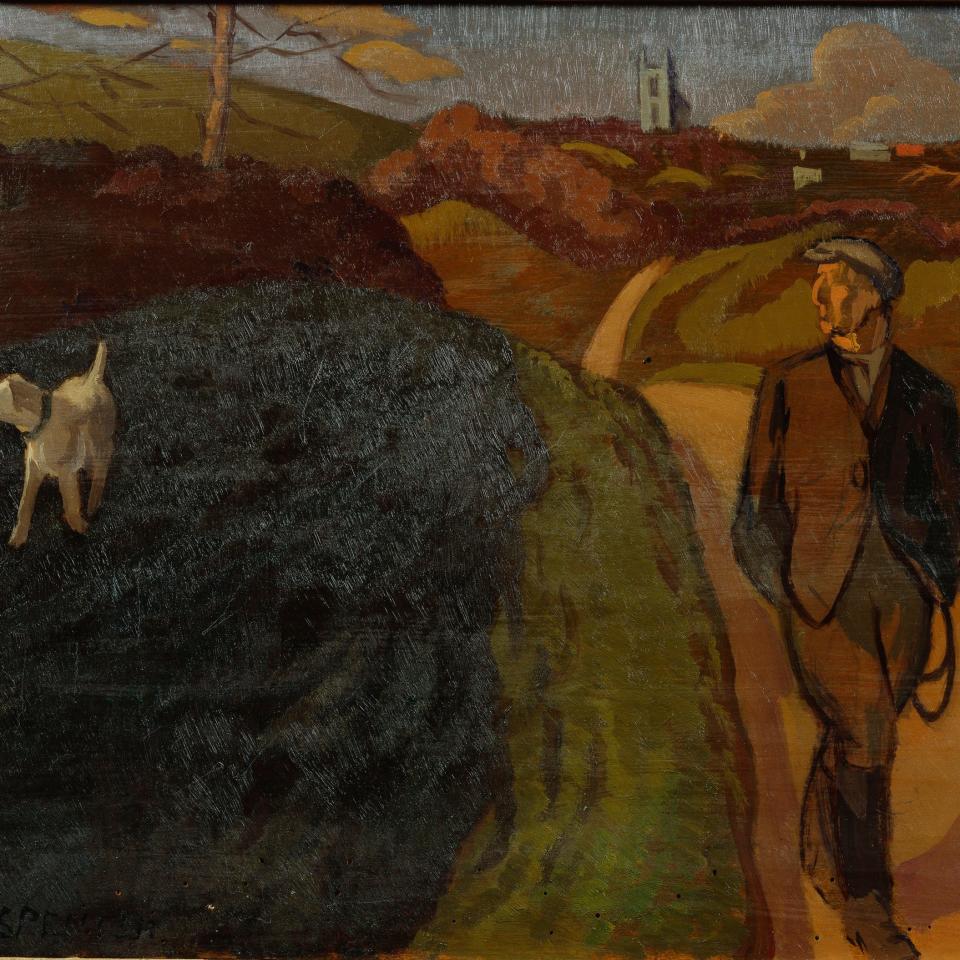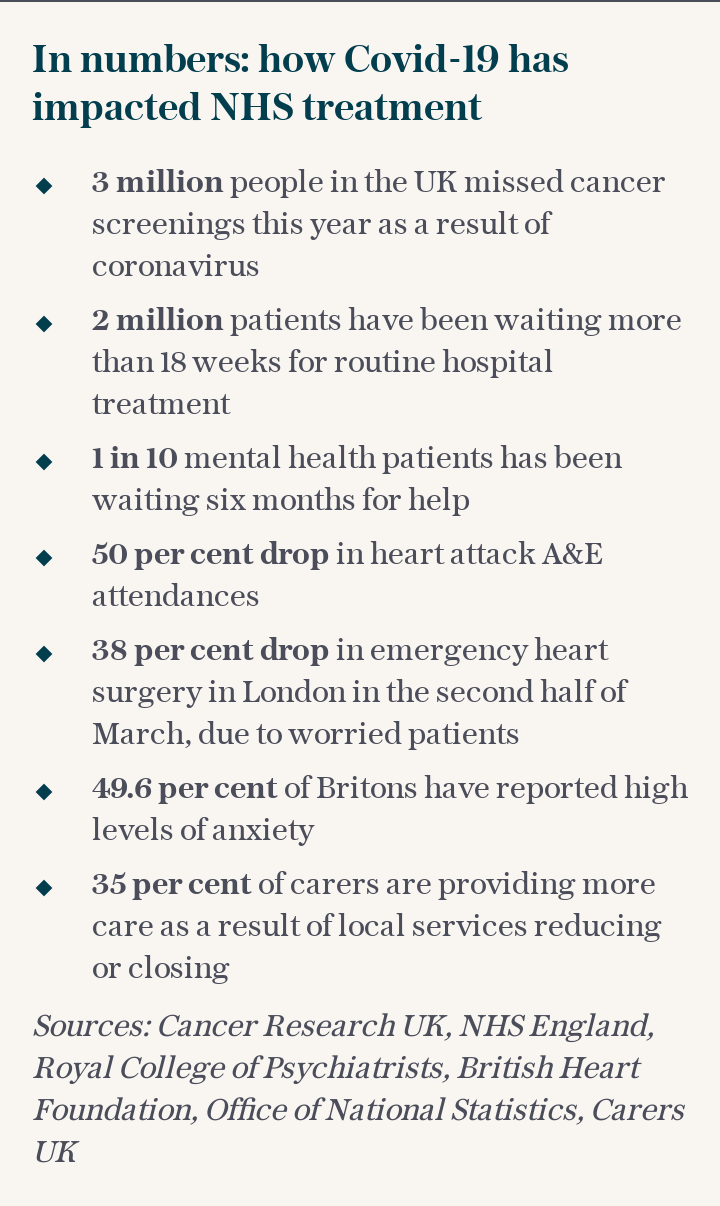Letters: Endless, capricious rule changes are demoralising the country

SIR – The Government’s constant, last-minute rule changes on Covid-19 are playing damaging games with our minds.
We are a couple in our 70s and face a long winter, with no close contact with our families. To lift our spirits, we planned a number of mini-breaks in Britain over the coming months, with one other couple each time. We are all extremely careful people, and would not eat in restaurants or visit shops, but would benefit enormously from the change of scene. We have now been moved to Tier 2, so cannot do this.
We are hugely disappointed. It just feels unnecessary. One consistent rule to shield the elderly and vulnerable would be manageable.
Jean Thompson
Woodham Ferrers, Essex
SIR – I am sure that the elderly and vulnerable in Wales will comply with the new lockdown measures (report, October 20) to help reduce intensive care bed uptake and deaths. But why has the rest of Wales also been asked to do the same? We know that the average age of death from Covid-19 is 83 years old. If you are under the age of 45, the risk is extremely small.
It is time for the latter group to be released from lockdown in order to save the economy, people’s livelihoods, and the physical and mental health of the whole population. A heavy-handed approach cannot be justified when the science has identified which adults could cause the NHS to become overwhelmed.
Dr Christopher M Keast
Reading, Berkshire
SIR – How nice: Granny and Grandpa have followed the rules. Now let’s lock them in their houses so that young people can go out and spread the virus among themselves.
James Hawkins
Hayling Island, Hampshire
SIR – Two weeks ago, I suggested to a friend (an eminent doctor) that we were moving from a pandemic to a situation where Covid-19 was endemic in the population. He accused me of playing games with words.
Yet Sir Patrick Vallance has now said precisely the same thing, suggesting that “the notion of eliminating Covid is not right”, and adding that people “would have to learn to live with [it]”.
Surely, in light of this belated recognition of the obvious, we need to radically to rethink radically our approach to the virus and put a stop to this endless cycle of lockdowns.
Brian Gedalla
London N3
SIR – Ian Rennardson (Letters, October 20) criticises Tony Blair for contacting the “overworked and stressed” Matt Hancock about quarantine rules.
The fact that Mr Blair needed to seek clarification speaks volumes about these rules. This failure of a government may well be overworked and stressed, but misdirected hard work is no better than no work at all.
Clive Pilley
Westcliff-on-Sea, Essex
Standing up to China
SIR – Alexandra “Grandma” Wong (report, October 19), a fearless 64-year-old campaigner who has spent 14 months being detained without trial on the Chinese mainland, embodies the bravery, determination and resilience of the Hong Kong protesters who have inspired the world.
During her detention she was forced to sing the Chinese national anthem, photographed holding the Chinese flag and had to confess in writing that her activism was wrong. Such behaviour is an all-too-common characteristic of the Chinese authorities’ determination to trample on dissent.
Activists such as Grandma Wong deserve international support, which is why the All-Party Parliamentary Group on Hong Kong has urged all nations, including Britain, to impose sanctions on those responsible for the treatment of Grandma Wong and hundreds like her. This brave woman has also called for urgent international action on behalf of 12 Hong Kong youths who are being held in prisons on the mainland, and other young people who have been unreasonably detained.
The Chinese Communist Party needs to understand that Grandma Wong and Hong Kong’s grandchildren represent the future, not Tiananmen tanks, coercion, and repression.
Lord Alton of Liverpool
Vice-Chair, All-Party Parliamentary Group on Hong Kong
London SW1
Telling tails
SIR – Colin Henderson (Letters, October 20) seeks a hand -signal to discourage tailgaters.
I was told it was to hold the pad of the index finger a short distance from that of the thumb, in view of the offending driver, highlighting so as to highlight the very short distance between the vehicles. I am not aware that it has ever been misinterpreted.
Adam Herrick
Sawston, Cambridgeshire
SIR – I show signal to a tailgater by showing one finger (you are only one car-length behind me). If that doesn’t work, I show two fingers (you should be two car-lengths behind me).
Nigel Johnson-Hill
Harting, West Sussex
SIR – Slow down and let them pass. They can take their dreadful driving elsewhere.
Liz Beaumont
London SW19
SIR – I have found that judicious use of the hazard lights usually slows tailgaters down painlessly and safely.
Arthur W J G Ord-Hume
Guildford, Surrey
Scammers’ paradise
SIR – I am about to be arrested by Her Majesty’s Revenue and Customs, will soon lose my Amazon Prime status, and recently had £300 taken from my bank account.
For anyone even more elderly and confused than me, these frequent telephone calls could be terrifying. Were I to respond fully to them, money would be taken fraudulently from my account, yet it seems these scams go unchecked and unpunished.
That most calls probably originate abroad is, given modern technology, surely no excuse for BT and others to do nothing. If I block the caller’s number it is only one of many that they use and they are back the next day. I could pay BT to have caller ID, but I would still have to put down The Telegraph to get up and check every call that comes in.
Why is it that nothing can be done to stamp out this blight?
Will Rumsey
Crowthorne, Berkshire
Divided Unionists
SIR – Nick Timothy (Comment, October 19) is wrong to panic over the Union. The real problem is less the structure of Scottish government than the failure of Scotland’s Unionist parties. Separately, and under frankly appalling leadership, they poll very badly. Yet they insist on ploughing their separate furrows.
In spite of this, the SNP has never won 50 per cent of the vote in a Scottish election. In the latest local by-election it won a seat from the Tories with 42 per cent of the vote. And it can usually reckon on winning any seat when the Unionists insist on splitting the opposition three ways. That is why George Galloway’s new Alliance for Unity is winning such support. It demands that only one Unionist candidate stands in each constituency against the minority SNP. This is the real way to defeat it. It is hardly rocket science, but still appears too complicated for the Scottish leaders of the traditional parties.
If Mr Galloway’s strategy is not implemented in the by-election to be held when Margaret Ferrier is forced out, he will fight that seat and win it. Then Unionists of all parties will be forced to listen.
Professor Alan Sked
London School of Economics
Church profligacy
SIR – Sadly, we cannot expect the Church to reform itself financially anytime soon (Letters, October 20).
Our parish pays the Oxford diocese £70,000 each year, which is two-thirds of our income. The parish share provides the diocese with 80 per cent of its £25 million income each year. The Bishop of Oxford tells me that he is seeking ways to restore income before reducing expenditure. This is in spite of the fact that the diocese has the same number of area bishops, archdeacons and support staff that it had 100 years ago, when there were more than 800 parish priests. There are now only 370.
I have no doubt that a similar state of affairs pertains in the other dioceses in England. The burden of this huge bureaucracy will remain firmly on the shoulders of parish volunteers and donors for a long time to come.
Stephen Billyeald
Pangbourne, Berkshire
Wake-up call
SIR – Instead of messing about with the clocks (Letters, October 20), why don’t people just get out of bed an hour earlier in summer?
Robert Ward
Loughborough, Leicestershire
What’s become of all the lockdown walkers?

SIR – At the start of lockdown, Grant Shapps introduced his greener transport initiative to get Britain healthier by walking and cycling.
Having I walked five or six miles every day for many years, I began to see many new faces on my daily stroll. But after about a month their numbers had declined rapidly, and after three months just one new couple remained. Even they have gone now.
The story with cyclists is the same. Hundreds were out every day, but now they too have gone. So, at least in Buckinghamshire, the Shapps green transport revolution has failed and should be quietly abandoned.
However, if Buckinghamshire County Council wants to make walking safer, which it claims it does, it could cut back all the overhanging vegetation on properties under its care, and stop builders’ cars and vans blocking footpaths to pedestrians.
Dr S B Primrose
High Wycombe, Buckinghamshire
Stuck in a stationary queue for NHS services
SIR – If we are to believe that the NHS is open, why can’t I get an ear-syringing appointment? And why has my pacemaker appointment been postponed indefinitely?
Colin Thomas
Bridgend, Glamorgan

SIR – In June our local hospital made an outpatient appointment for my wife in December. Last Monday, she received two letters from the hospital, both written on the same day; the first changed the initial appointment to a telephone appointment and the second cancelled the telephone appointment.
We’ve yet to decide if this represents a flexible response to the national crisis or just wasteful incompetence.
Paul Saunders
Thame, Oxfordshire
SIR – Our NHS health centre is a multi-doctor surgery that looks after about 30,000 patients who do not have a named doctor. My wife’s repeat prescription didn’t arrive at our pharmacy, so we visited the centre to explain our problem. We were met at the door by a bouncer who said that no one could be allowed in without an appointment and that the only way to get one was by phone. We sat in the car park for a long time, in a queue of nine on the phone. We are both in our 80s.
Having spoken to a receptionist, our problem was sorted with an apology and the promise of a prescription in two days’ time. I don’t complain about the NHS, which I publicly applauded recently, only about some of those who run it.
Jim Lane
Stourbridge, Worcestershire
Letters to the Editor
We accept letters by post, fax and email only. Please include name, address, work and home telephone numbers.
ADDRESS: 111 Buckingham Palace Road, London, SW1W 0DT
FAX: 020 7931 2878
EMAIL: dtletters@telegraph.co.uk
FOLLOW: Telegraph Letters on Twitter @LettersDesk


